24 hours with Behishta Nazir (H.24)
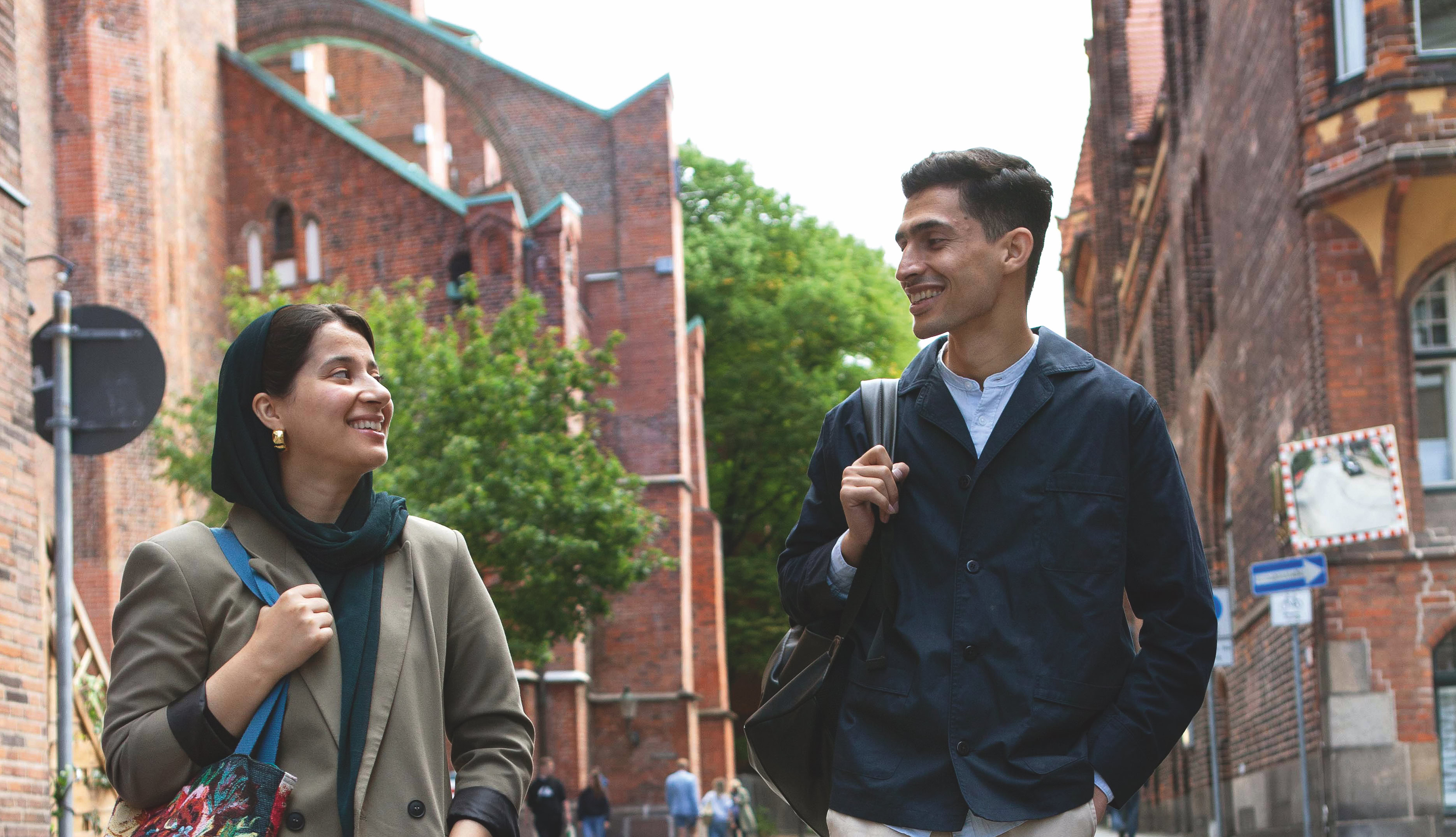
She is one of the first Imagine Fellows recipient to graduate from HEC. In northern Germany, where she lives with her husband, let’s spend a day in the life of a resilient young woman.
Lübeck, north of Hamburg, Germany, is a city with Gothic architecture along the shores of the Baltic Sea. The place where Behishta has been living for a few months, 7,000 km away from her native Kabul. This 26-year-old Afghan woman came here with her husband, Matiullah Rahmaty. Together, in April 2022, they reached Europe after a long and dark odyssey to escape the Afghan capital, which had fallen to the Taliban. Holding a double degree in human resources and management from Kabul Public University and also a graduate in business management from a private university, Behishta spent two years on the Jouy-en-Josas campus, where she earned a Master’s in Sustainability & Social Innovation (SASI) last July. Today, the couple runs two companies created by Mati: BrightPoint Consulting, which offers consulting services for companies working in development in difficult areas, and Tamveel, a social venture preparing for its seed-stage funding. Their daily life resembles that of young German entrepreneurs, blended with Afghan traditions.
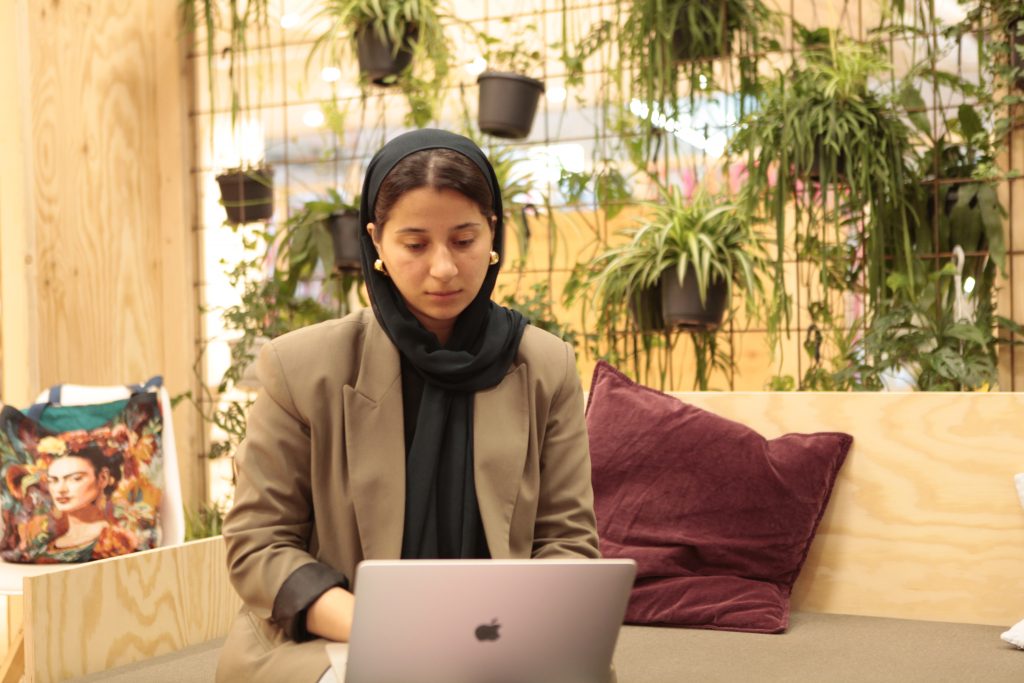
7:00 am By the river
Behishta and her husband live in northern Lübeck, far from the historic center, in a townhouse shared with Mati’s parents and a Turkish family. A few hundred meters separate the grid-like alleys from the banks of the Trave River. In the mornings, she goes for a run along the river, which flows into the Baltic Sea a few kilometers away. A handful of joggers and a few dog owners walk along the riverbanks, once a hub for commercial exchanges. Today, leisure boats have replaced merchant ships. On the horizon, the sea and Copenhagen are visible in the distance. Upon returning home, the young woman prepares an Afghan breakfast: eggs with tomato paste, cheese with marmalade, and green tea. “It feels familiar. We buy spices and nuts from an Afghan store in Hamburg. There’s a whole street selling Afghan, Turkish, or Persian products. It’s the right place for migrants wanting to reconnect with their culture,” explains Behishta, who has kept the habit of eating on the floor, on beautiful carpets. Shoes from the house’s residents fill the entrance.
10:00 am On a bus trip
To reach the old town, where Behishta and Mati have made it a habit to work in a free coworking space, the bus ride takes about half an hour. Long stretches of tree-lined houses dot the journey. The streets are quiet, and the locals disciplined. We take this time to talk about the past. Behishta has no memory of the first Taliban regime before 2001. She will remember the fall of Kabul in 2021 for the rest of her life though.
“It was August 15. We knew it was coming because the day before, the Taliban had invaded Jalalabad, two hours from Kabul. Chaos reigned in the city. People were rushing to banks to withdraw their money. One night, all the female employees of BrightPoint, the company Mati created and for which I was working, received a WhatsApp message advising them not to come in the next day. My sister and I went to a travel agency to retrieve our passports and money, as we were trying to get a visa for India before the country collapsed. They couldn’t help us. Then President Ashraf Ghani fled the country, leaving the Taliban free to take over many parts of the capital. They were everywhere. Some of them were extremely young.” Behishta and her five siblings were forbidden to leave the house by their father, who had the previous Taliban regime in mind.
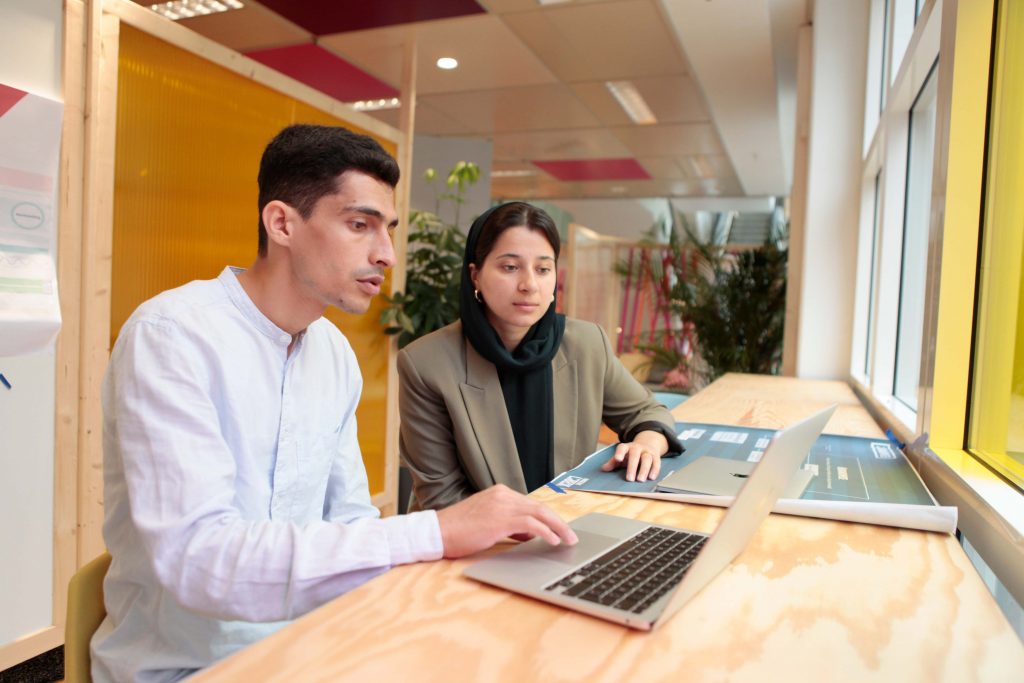
11:00 am A coworking space
Large glass windows, modern design, and an open kitchen: the coworking space Behishta and Mati love spreads across several floors. Mati and Behishta grab some tea and pick a table overlooking the outside activity to work.
For BrightPoint Consulting, she manages impact-oriented projects, particularly in emerging countries. “Currently, I’m drafting a proposal for the Dutch Ministry of Foreign Affairs to conduct a market study on the economy, businesses, and investments in Iraq. I’ve already responded to a project for Altaï Consulting on the inclusion of women in the private sector in Afghanistan,” she explains. Inclusion and integration are topics dear to her. Behishta Master’s thesis focused on “the motivations, challenges, and strategies of refugees for professional integration in France.” She talks about her own refugee journey quite naturally. It began in Kabul, a few months after the Taliban’s arrival. The newly weds were ready to do anything to escape the country.
1:00 pm Another memory
One night, the couple received a call and instructions to head to the city of Mazar-i-Sharif, in the far north of the country. There was another airport, where the Taliban were trying to keep planes grounded. The couple managed to fly out eleven days later. “Until we were on the plane, we didn’t know where we were going. We just had to leave the country as quickly as possible.” The plane landed in Abu Dhabi, but their journey was far from over. Stuck in a camp built during Covid, Behishta and Mati were not allowed to leave the premises and were even confined to their room most of the time. Time dragged on, especially since they didn’t have access to the internet for weeks at a time. Nor Amazon. “The first thing we ordered when we could was books,” Behishta recalls. During their seven months in the camp, they were only allowed out twice. Once, they were taken to the zoo. The other time, they went to Dubai for administrative processes to get their papers in order.
Behishta applied to HEC during these long days in their small room. “A few months before the Taliban’s arrival, I had applied for a Master’s in France, then I was contacted through the embassy by Sophie Dimich-Louvet (E.24), the admissions director at HEC, who told me about Imagine Fellows. I had a video interview, but it was very stressful because the connection kept dropping. The HEC team was reassuring and told me they understood. Still, I was worried.” A few months later, Behishta and Mati flew to Hamburg before heading to Lübeck, where friends offered to host them. The young woman left Germany for Jouy-en-Josas by bus shortly after.
“After leaving Afghanistan, everything was a new beginning. On campus, I made new friends, adapted to the courses, and adjusted to this new life. One night, there was thunder, and I woke up in panic, thinking it was an explosion. But no, I was no longer in Kabul.”
Behishta spent two years on the HEC campus, pursuing her Master’s in Sustainability and Social Innovation. She particularly enjoyed the courses Business & Peace and Business & Human Rights. Her speech in front of her classmates at the graduation ceremony is well remembered:“I am a refugee, Afghan, Muslim, raised in wartime. These elements shape my identity and only further boost my level of ambition, resilience, and potential.” Upon returning to Lübeck, Behishta reunited with her husband but lost her refugee status. She now has to restart the long administrative process with the German immigration office, receiving help from an NGO called Nicht Allein (Not Alone, in English).
2:00 pm On a train to Mölln
Our hunger setting in, we take the train to Mölln, a town 30 kilometers south of Lübeck. Another medieval town, surrounded by lakes and crossed by a canal. A favorite for tourists and visitors seeking peace and quiet. Last July, Mati and his two associates opened a small lakeside hotel there with their company Tamveel, a business Mati founded in Kabul in 2019, which Behishta now co-manages. “SeidenStrasse Restaurant and Culture House” (“Silk Road Restaurant and Culture House”) reads the sign in front of the small hotel. This is Tamveel’s first project developed in Europe (the name Tamveel means “financing” in Persian and Arabic).
With the five hotel rooms and the restaurant’s 26 seats booked, the place runs at full capacity. The employees are Afghan and Iranian immigrants who serve dishes reminiscent of home. Massoud, Behishta’s brother, greets us. He has the same green eyes as her, an inheritance from their grandmother. Their third partner is Zabih. Once a businessman, the Afghan man used to run a chain of pharmacies and was a YouTube star known for his Sufi poems sung in a rock-and-roll style. He, too, has had to reinvent himself. Our plates are filled spinach, lentils, onions and naans. Some eat with their hands, others with silverware. The tables are named after Afghan cities: Badakhshan, Bamiyan, Balkh. Ours is named Kabul.
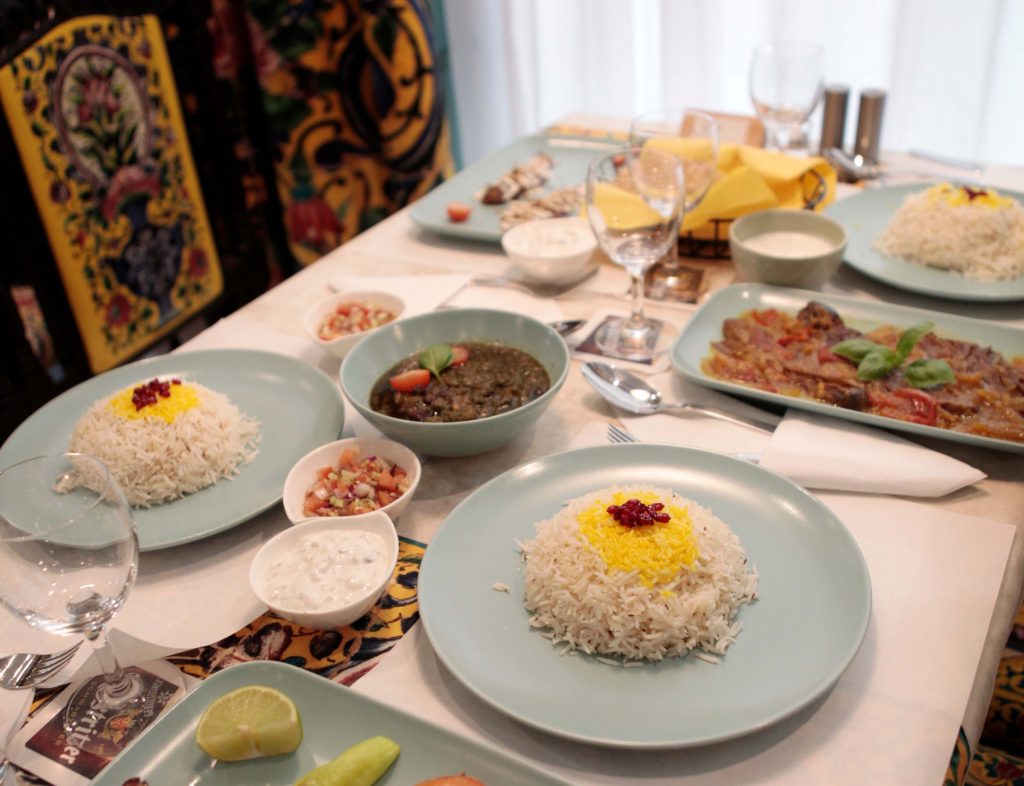
“Here, the idea was to create a socially conscious hotel and restaurant,” explains Mati in perfect French. The entrepreneur speaks six languages fluently and was even in charge of communications at the French Institute in Kabul. The impact investment platform he created is organizing a fundraising campaign. Adrien Nussenbaum (H.01), co-CEO of Mirakl, is among his investors. This alumnus, a major donor to the HEC Foundation, is behind the HEC Imagine Fellows program which benefited Behishta.“Adrien has been like a mentor to me. Like him, I hope to give back one day,” she says gratefully.
4:30 PM The daily call
Every day, Behishta hops on video calls to speak with her family—her other brothers and sisters, scattered between the United States and Germany—but most importantly, with her “padar” (father). Her father worked in education, but schools have closed. He has not yet been able to board a plane: he is still stuck in Islamabad, where he has been waiting for a visa for France or Germany for several months.
I lend my room to Behishta for this long-distance meeting that helps preserving some form of family unity. With a dark wooden bed and chairs, floral fabrics and rugs on the floor, the cheerful and oriental ambiance of the rooms contrasts with the Nordic spirit that dominates this part of Germany. After a few business meetings, Mati and Behishta wrap up their work day, and board on a train bound to Lübeck. Tomorrow it will all start again.
Behishta’s story is striking, moving, and poignant, like a novel you never want to end. Documentary producer Caroline Gillet allow us to keep up with her journey through a podcast for French radio channel France Inter called «Inside Kabul», in which Behishta has been telling her story since the summer of 2021. A story that is far from over.
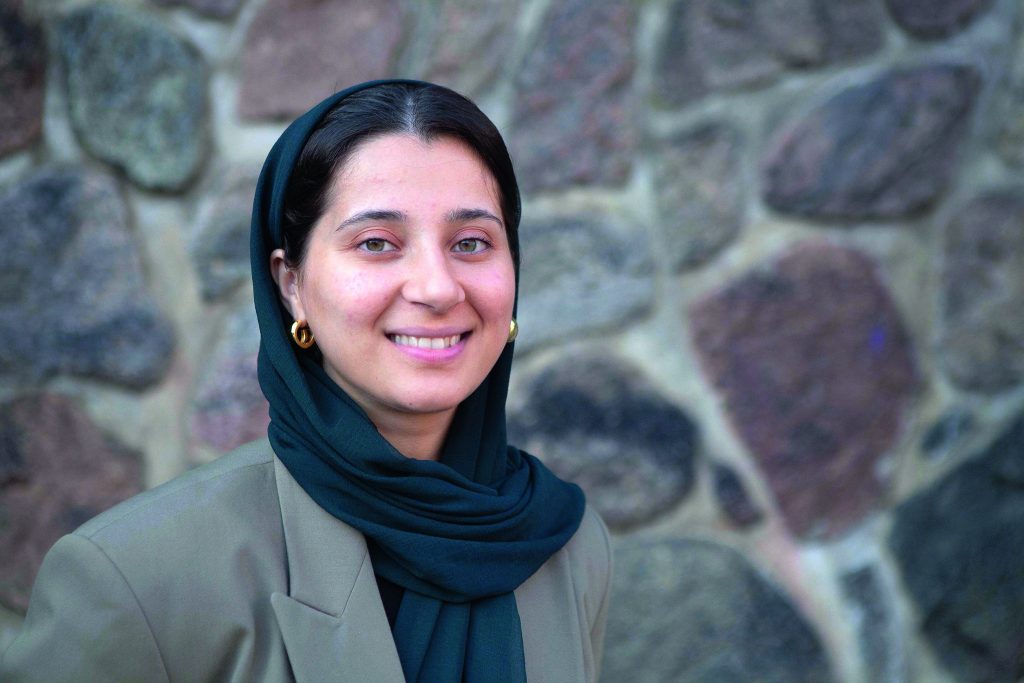
Published by Daphné Segretain

